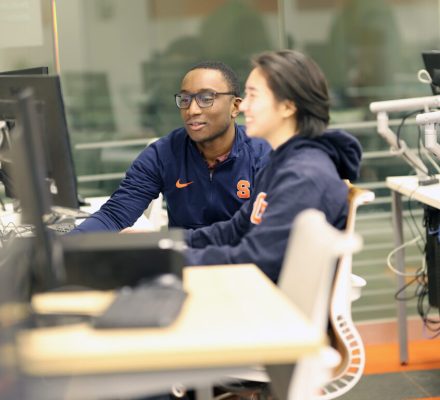Modern computing is on the cusp of witnessing paradigm changes expected to have a more far-reaching impact than what Moore’s law predicts. Engineering and Computer Science (ECS) researchers are working at the forefront of such a paradigm shift, conducting cutting-edge research from silicon-based storage and interconnect technologies, to quantum information science, neuromorphic computing, and human-centric computing.

ECS researchers are conducting research to understand fundamental characteristics of quantum systems through experimental, theoretical, and computational studies. These findings are used to gain control of and induce novel responses in such systems and enable new applications in quantum sensing and quantum computing. Emerging neuromorphic computing is another area in which we are making strides in developing new algorithms and hardware architecture to harvest massive parallel computation communication capability. Advanced research in this area will help achieve information processing capabilities that rival human brains.
Some notable ECS news stories in this area include:
- Alex K. Jones, the Department Chair of Electrical Engineering and Computer Science and Klaus Schroder Endowed Professor for Engineering, has received National Science Foundation (NSF) Early-concept Grants for Exploratory Research (EAGER) award for computer memory research.
- Assistant Professor in Electrical Engineering and Computer Science, Endadul Hoque, and Ph.D. student, Polina Kozyreva, received the Best Paper Award at the International Workshop on Search-Based and Fuzz Testing (SBFT 2025).
- Electrical Engineering and Computer Science Professor Bryan Kim received a National Science Foundation (NSF) CAREER Award to build on his previous research on data storage systems and contribute to the field by exploring new ways to improve the memory and storage systems of computers.
- Electrical Engineering and Computer Science Professor Moamer Hasanovic received a grant from the National Science Foundation (NSF) to provide training, education, and career development for quantum technicians.
- ECS Students Team Up With Public Health and Anthropology Faculty to Develop COVID-19 Symptom Tracking App
- Electrical Engineering, Computer Science Researchers Win Artificial Intelligence Award
- Professor Qinru Qiu Named a Distinguished Member of the Association for Computing Machinery
- Professors Qiu and Gursoy Receive 2020 IEEE Region 1 Technological Innovation (Academic) Awards
Please explore the departmental webpages or the researchers’ websites below for more information.









